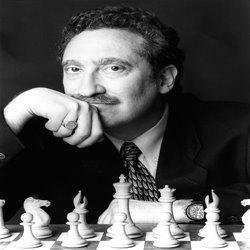
Pandolfini's Puzzler #56: Outflanking and Outranking
Professor: Welcome, everyone.
In its typical blasé manner, the class offered a communal smile back.
Professor: How unusual for this class, Thomas. You have your hand up. What is it?
Thomas: I saw a position in Washington Square Park the other day I’d like to share.
Professor: Please do.
Question 1: How does White force a win?
Lucian: Can’t you find that position in Capablanca?
Thomas: I think so.
Zephyr: So they agreed to a draw?
Thomas: Yeah. White kept muttering something about the opposition.
Idris: The opposition? That’s ridiculous!
Hale: White has nothing but winning moves.
Zephyr: Perhaps they hadn’t read Capablanca.
Ryan: Or maybe they didn’t know about outflanking.
Idris: You mean when one king can outmaneuver the other because of obstruction and interference in the oppositional field?
Ryan: Something like that.
Rachel: Who was the higher-ranked player?
Thomas: I think White.
Zephyr: Looks like he got outranked.
Lucian: He should have outflanked.
Professor: What do you say we move on? Here’s a position once analyzed by Emanuel Lasker.
Question 2: What is White’s simplest win?
Zephyr: There may be several ways to win this position.
Rachel: Quite possibly.
Lucian: Simplification to a winning outflanking setup is clearly one of them.
Hale: It’s another case of less being more.
Ryan: Of course, when you outflank, it doesn’t automatically win.
Zephyr: The rank you capture on is important.
Lucian: It helps when the pawn you capture is on its third rank.
Idris: Of course. After the capture, the king is sitting on a critical square.
Professor: Now you’re getting the idea. Let’s drive home the concept a little further with our next position.

Question 3: What is White’s simplest win?
Lucian: White could win the g-pawn immediately.
Thomas: True. But there’s a better way.
Zephyr: Yep, the outflanking way.
Hale: Once again, less is more.
Ryan: Here, at least it’s faster.
Thomas: And easier.
Professor: I think you’re ready for another problem.
Question 4: What is White’s simplest win?
Professor: This is a position straight out of an old Yugoslav journal.
Zephyr: I knew that.
Lucian: Maybe. But you weren’t the first to get the answer.
Ryan: Idris got it first.
Zephyr: I knew that, too.
Professor: How about one more problem?
Question 5: What is White’s simplest win?
Ryan: Isn’t that a position composed by Capablanca and Lasker?
Hale: Aha. They were doodling together over a chessboard.
Rachel: That’s what they came up with?
Lucian: Well, that’s what they say.
Zephyr: Who’s they?
Idris: Capablanca and Lasker?
Professor: It feels like it’s time to go home.
Thomas: Is that all you feel?
Professor: No, I also feel I’ve been outflanked.
Answers below -- Try to solve NM Pandolfini's puzzles first!
Answer 1: Any move for White wins. The correct idea is to jettison the f-pawn so that White’s king can eventually maneuver to the f6-square.
After f6 is cleared, the g6-pawn falls if the white king can occupy any of the three critical squares (also known as key squares) on the same rank as the menaced enemy pawn. For the g6-pawn, White’s critical squares are d6, e6, and f6. If White’s king can occupy any of those three squares, the g6-pawn is a goner by force.
A clear winning line is 1. f7 Kxf7 (delaying the pawn’s capture doesn’t help) 2. Kd6 Kf8 (a meaningless diagonal opposition) 3. Ke6 Kg7 4. Ke7 (the dance of death continues) Kg8 5. Kf6 Kh7 6. Kf7, and the g6-pawn is lost.
A sample finish is 6…Kh8 7. Kxg6 Kg8 (a meaningless direct opposition) 8. Kh6 (with a knight-pawn, maneuvering the attacking king to the rook-six square avoids any stalemate trick tries) Kh8 9. g6 (a meaningful direct opposition) Kg8 10. g7, and Black’s king is squeezed off the home rank.
Note that in comparable situations the attacking king always has two squares to use in order to attack the enemy pawn (here, the possible attack squares are f6 and f7), while the defending king has but one place from which to defend that same attacked pawn (here, h7). Thus, the attacker always wins the pawn.
Answer 2: White wins immediately by 1. Rxc6! bxc6 2. Kxe4 Kb7 3. Ke5, and Black gets outflanked.
If 3…Kc7, taking a meaningless diagonal opposition, White gets to a critical square, 4. Ke6, and the c6-pawn is soon won.
Or if 3…Ka6, trying to counterattack, White wins with 4. Ke6 Kb5 (if 4…Ka5, then 5. Kd7 wins) 5. Kd6, and it’s zugzwang: nobody wants to move.
Answer 3: White could play 1. Qxg5, but more prudent is to convert to a winning outflanking setup with 1. Qc8+ Ke7 2. Qxe6+! fxe6 3. Kxg5, and Black gets outflanked.
Answer 4: The knight is trapped. It could be sacrificed for the f-pawn, but 1. Kxd5 Kg7 2. Nxf7 Kxf7 3. Ke5 Kg6 draws. The right way is to sacrifice the knight in order to set up a winning outflanking situation.
White wins with 1. 1. Ng6+! fxg6 (if 1…Kg7, then 2. Nf4 f6 3. g6 wins) 2. Kxd5 Ke7 3. Ke5 (a meaningful opposition) Kf7 4. Kd6, and Black gets outflanked.
Answer 5: The winning variation is 1. Rxa8+! Nxa8 (1…Kxa8 2. Kxc7 Ka7 3. Kc6 wins the b-pawn) 2. Kc8, when Black must jettison his knight, 2…Nc7 3. Kxc7. Thereafter, Black is outflanked, with White winning the b-pawn immediately.
Students tend to learn about the opposition before becoming acquainted with critical or key squares. Naturally, they come away thinking of the opposition’s primacy.
Lost in it all is one of the main purposes of the contest for the opposition. It’s a key tool in the fight over critical squares. Ultimately, the attacking king tries to use the opposition to occupy certain critical squares.
The defending king, on the other hand, doesn’t have to occupy those same critical squares. Rather, it uses the opposition to prevent the attacking king from occupying them. If the opposition affects the result of the position, it’s meaningful. If it doesn’t affect the result, it’s meaningless.
RELATED STUDY MATERIAL
- Watch FM Mike Klein's excellent video on tricky king-and-pawn endgames.
- Check out Bruce Pandolfini's previous article, Puzzler #55.
- Perfect your tactics at the ChessKid puzzles trainer.

